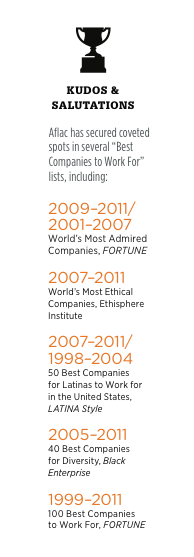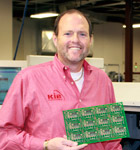
Everybody knows the Aflac Duck. Since 1999, it’s been quacking the Aflac name on TV commercials nationwide, serving as the avian spokesperson for Aflac Inc. of Columbus, Georgia, the largest supplemental-insurance provider in the United States. Behind the duck, however, is an insurance company that places people—not profits—first, according to Joseph E. Bohling, Aflac’s senior vice president and chief human resources officer.
Bohling joined Aflac in July 2011—just four months after a 9.0-magnitude earthquake and subsequent tsunami ravaged Japan, where Aflac has a sizeable customer base. The way his new employer reacted left a large and lasting impression. “Our CEO, Dan Amos, was in Japan,” Bohling says. “When Dan spoke to the Japanese political leaders and the Japanese people, many of who are our customers, he said, ‘We will pay our claims.’ He didn’t flinch and he didn’t hesitate. I think that speaks volumes about our company. We do what’s right.” To learn more, Profile asked Bohling about his company, his profession and the role of human resources in creating—and sustaining—a “people first” mentality.
You began your career as a complex commercial litigator, and later worked in management consulting, followed by sales and marketing. How has your legal and business background colored your approach to human resources?
Being a revenue producer really gives you a different perspective as you look at the human-capital side of the business. Too often, HR professionals are seen purely as administrative and transactional. A lot of business leaders don’t necessarily view it this way, but I see human resources as a strong business partner that can help with both the top line as well as maintaining the bottom line. It’s a true consultative function that delivers insight on business.
Can you give an example of how human resources can contribute strategically to business growth?
Across corporate America, there’s going to be a war for talent because the baby boomers are on the verge of retiring. The next generation, Generation X, is significantly smaller than the boomer cohort, so there’s going to be a gap in the amount of ready-now talent that’s capable of going into the C-suite. Companies that understand the gaps we have from a talent perspective—and respond in terms of talent management, leadership development, and succession planning—will be ahead of their competitors. To my very point, like many companies, some of our experienced people here at Aflac are on the verge of retirement, if not at retirement age already. We recognize that we really need to focus on understanding what our gaps are, and closing those gaps by developing people at junior and mid-management levels so they can realistically and effectively do well as they get promoted to senior positions.

Obviously, HR plays a strategic role at Aflac. What’s its cultural role?
There’s a saying out there: “Culture eats strategy for breakfast.” The thing about our organization—what has made it great since its inception in 1955—is that it’s always had a family culture where people feel like they’re part of something special. It’s an organization that regularly gets recognized as being one of the most ethical companies in corporate America, and one of the best places to work. While other companies have had thousands upon thousands of layoffs, Aflac has not. That’s because Aflac recognizes the importance of people. They truly are our number-one asset.
As the chief human resources officer—or truly, the chief culture officer—my role reflects who we are as a company. It’s my job to make sure the way folks are brought in, trained, developed, and promoted is by doing things the right way—by doing things ethically and by doing things well. That’s where I think performance management, talent management, and even succession planning can make a difference. When we talk about our talent population here, we’re talking not only about what they accomplish, but also about whether they are doing it “the Aflac way.” People who marry great business results with doing it the Aflac way are the people who are recognized, rewarded, and promoted here.
Speaking of great business results, is there a business benefit to Aflac’s culture?
Our CEO, Dan Amos, often says, “If you take care of your employees, they will take care of the business.” That’s a living testament to how we do things here. If you treat your people well, they ultimately are going to treat the customer well. And when you treat the customer well, they usually come back for more business. It’s the notion of what I call a “firm of endearment” (derived from the book, Firms of Endearment: How World-Class Companies Profit from Passion and Purpose by Raj Sisodia, Jag Sheth, and David B. Wolfe). Companies that treat their employees well, their customers well, their shareholders well, and their community well ultimately enjoy better business results. It’s not rocket science. Especially in these economic times that we’re in, taking care of the people that work for you will oftentimes get you in a growth mode versus a cost-cutting mode.



